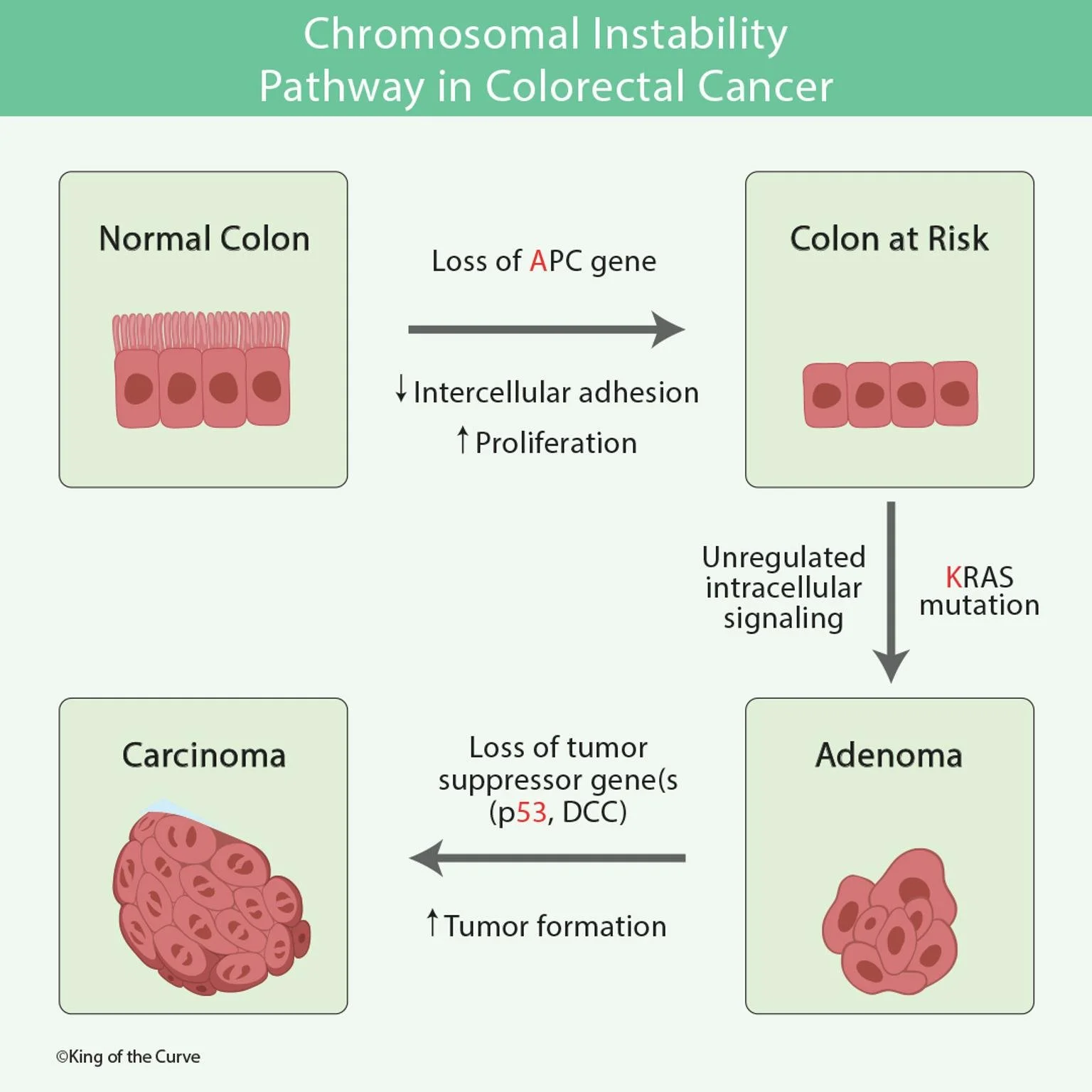🧬 Chromosomal Instability Pathway in Colorectal Cancer
Colorectal cancer (CRC) is one of the most common malignancies worldwide and develops through a series of well-defined genetic mutations. One of the key mechanisms involved in its progression is the Chromosomal Instability (CIN) pathway. This pathway involves stepwise genetic alterations that disrupt normal cellular regulation, ultimately leading to uncontrolled cell growth and cancer formation.
🧬 Normal Colon to Colon at Risk
The process begins with the loss of the APC gene—a critical tumor suppressor that regulates cell adhesion and proliferation.
Effect of APC loss: Reduced intercellular adhesion and increased cell proliferation.
Result: A “colon at risk” state where cells are more susceptible to additional mutations.
⚠️ KRAS Mutation and Adenoma Formation
In the next stage, KRAS gene mutations occur. KRAS is an oncogene responsible for regulating cell signaling pathways related to growth and division.
Mutation effect: Unregulated intracellular signaling, leading to uncontrolled cell proliferation.
Outcome: Development of an adenoma, a benign tumor that can progress to malignancy if additional mutations occur.
🛑 Loss of Tumor Suppressor Genes and Carcinoma
The transition from adenoma to carcinoma often involves the loss of additional tumor suppressor genes, such as p53 and DCC.
Effect: Loss of regulation over cell cycle control and apoptosis.
Outcome: Increased tumor formation and progression to invasive colorectal carcinoma.
📊 Key Genetic Events in CIN Pathway
Chromosomal Instability (CIN) Pathway
| Stage | Key Mutation | Biological Effect | Pathological Outcome |
|---|---|---|---|
| Normal Colon → At Risk | Loss of APC gene | ↓ Adhesion, ↑ Proliferation | Colon at risk for malignancy |
| At Risk → Adenoma | KRAS mutation | Unregulated intracellular signaling | Benign adenoma formation |
| Adenoma → Carcinoma | Loss of p53, DCC | Loss of tumor suppression, ↑ Tumor growth | Invasive colorectal carcinoma |
💡 Importance of Early Detection
Understanding the CIN pathway helps in identifying individuals at high risk for colorectal cancer and developing targeted prevention strategies. Regular screening methods like colonoscopy can detect adenomas before they progress to carcinoma, significantly improving survival rates.
📢 Call to Action
Colorectal cancer is highly preventable with timely intervention. If you are over 45 or have a family history of CRC, schedule a screening today. Early detection saves lives.
Frequently Asked Questions (FAQs)
-
Aim for 4-6 focused hours, ensuring you incorporate breaks to avoid burnout.
-
Practice mindfulness techniques, take practice exams under realistic conditions, and maintain a balanced lifestyle.
-
Set short-term goals, seek support from mentors, and reward yourself for small achievements.
-
Regular exercise improves focus, reduces stress, and enhances overall mental clarity.
-
KOTC offers personalized learning tools, gamification features, and adaptive question banks to help students stay on track without burnout.


